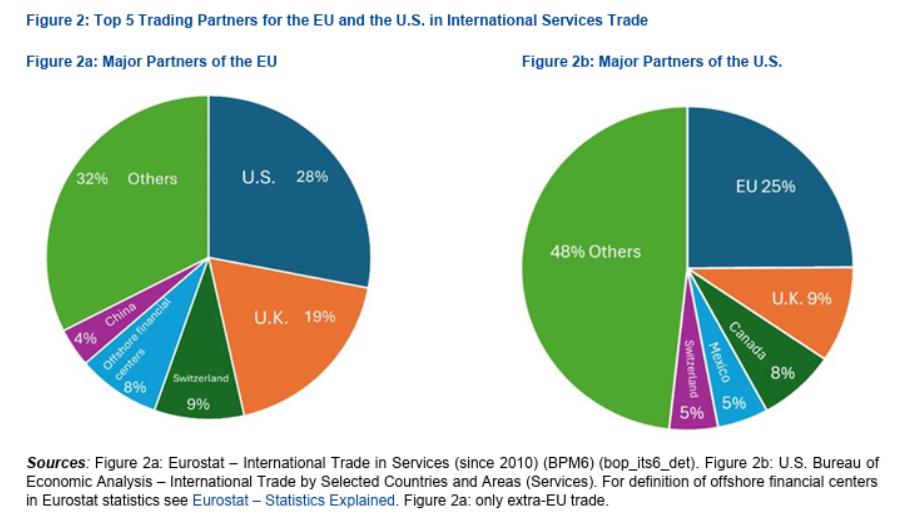A carrot-and-stick strategy in services could help Brussels with US tariffs


Trade negotiations between the US and the European Union run until August 1st, the date on which new 30% tariffs on all imports from Europe come into effect if no agreement is reached between the two economic blocs. Negotiations have focused solely on the trade of goods, with the US president claiming that the country has a large deficit compared to Europe. Bringing services into the talks could help Brussels negotiate with the US administration . Economists at the Kiel Institute advise Brussels to promote a "carrot and stick" policy in digital services, where giants like Google, Microsoft, and Meta are dominant in the European market .
" Europe treats us very badly " or " they are very bad " are expressions Donald Trump has repeatedly used to justify the imposition of tariffs on European imports. The US president bases these accusations on the fact that the US has a deficit in trade relations with Europe.
Trump's calculations consider only trade in goods. Services are excluded, despite the fact that total trade in services between the US and the EU is similar in size to total trade in goods between the two economies, according to Eurostat, as shown in a paper developed by economists at the Kiel Institute. According to a report published this morning by the Financial Times , the European Commission is preparing a list of potential tariffs on services offered by US companies , as well as export controls.
Total trade in services between the EU and the US reached €816.9 billion in 2024, while total trade in goods between the two blocs was around €867.1 billion, the paper shows. "It is important to note that bilateral trade in services has grown considerably faster than trade in goods," the economists explain , highlighting that between 2014 and 2024, total trade in services between the EU and the US increased by around 169%, while trade in goods "only" doubled.
"In 2024, EU services exports to the US totaled €334.5 billion, while EU services imports from the US totaled €482.5 billion. This resulted in a US bilateral trade surplus in services (EU services trade deficit) of €148 billion, which represents about three-quarters of the US trade deficit in goods with the EU (about €197.4 billion in 2024, according to Eurostat)," the study states.
US and EU have strong trade relations in services
Given these figures, experts say that including trade in digitally delivered services as part of the negotiations could help reduce the costs that tariffs will have on the EU as a whole , with the European Commission playing with some concessions on access to the European market (' carrot' ), while threatening retaliation on these services (' stick' ), if an agreement fails.
The paper by Frank Bickenbach, Holger Görg, and Wan-Hsin Liu highlights the strong growth in trade in services, particularly digital services, where large North American multinationals play a central role.
"Among the different types of services, EU-US bilateral trade relations in digital services are of paramount importance for both economies," the experts explain, noting that this applies "especially to US exports of digital services to the EU ." "In almost every year of the research period, the US surplus in digital services trade with the EU was even larger than the surplus in overall services trade with the EU ," they add.
The paper further concludes that the two most important components for EU-US trade in digitally delivered services are the digitally tradable elements of “other business services” and “fees for the use of intellectual property.”
The experts propose that Brussels dangle " carrots," agreeing to remove barriers to trade in services and allowing digital service providers easier access to the European market. "This would also be beneficial for the EU itself, since barriers to trade in services are not only barriers between the EU and third countries, but are also often barriers to the completion of the European Single Market for services," the document adds.
On the other hand, the European Commission, as a stick , could " threaten to target the service sectors with retaliatory measures: the EU could threaten to further tighten its regulations on competition, data protection, and privacy policies , and become (even) stricter with companies, including American tech giants, in these sectors. The EU could also threaten to introduce a Digital Services Tax at the European level," directing targeted threats at large North American multinationals.
This strategy may reduce the "costs" associated with tariffs, but it doesn't come without a catch. "If the EU decides to offer the Trump administration some services-related carrots to further open its services market to US service providers, this could further increase the EU's dependence on US tech giants , which already hold a dominant position in several EU digital services markets."
"It is highly likely that any political decision in this area will ultimately require the EU to make certain significant concessions to the US, with some member states bearing a greater share of the costs of these concessions and their impacts than others . Nevertheless, including trade in digital services as part of the negotiations could help reduce these costs for the EU as a whole," the paper concludes.
ECO-Economia Online





